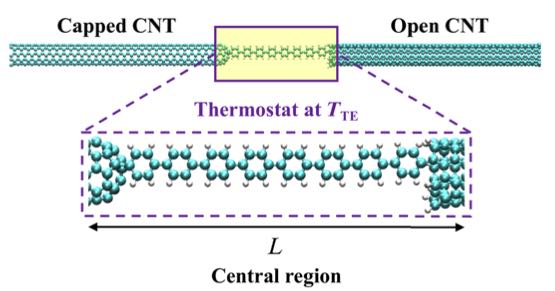Thermal management is a current global challenge that must be addressed exhaustively. We propose the design of a nanoscale phononic analog of the Ranque-Hilsch vortex tube in which heat flowing at a given temperature is split into two different streams going to the two ends of the device, inducing a temperature asymmetry. Our nanoscale prototype consists of two carbon nanotubes (capped and open) connected by molecular chains. The results show that the structural asymmetry in the contact regions is the key factor for producing the flux asymmetry and, hence, the induced temperature-bias effect. The effect can be controlled by tuning the thermal-equilibration temperature, the number of chains, and the chain length. Deposition on a substrate adds another variable to the manipulation of the flux asymmetry but the effect vanishes at very large substrate temperatures. Our study yields insights into the thermal management in nanoscale materials, especially the crucial issue of whether the thermal asymmetry can survive phonon scattering over relatively long distances, and thus provides a starting point for the design of a nanoscale phononic analog of the Ranque-Hilsch vortex tube.

Thermal management is a current global challenge that must be addressed exhaustively. We propose the design of a nanoscale phononic analog of the Ranque-Hilsch vortex tube in which heat flowing at a given temperature is split into two different streams going to the two ends of the device, inducing a temperature asymmetry. Our nanoscale prototype consists of two carbon nanotubes (capped and open) connected by molecular chains. The results show that the structural asymmetry in the contact regions is the key factor for producing the flux asymmetry and, hence, the induced temperature-bias effect. The effect can be controlled by tuning the thermal-equilibration temperature, the number of chains, and the chain length. Deposition on a substrate adds another variable to the manipulation of the flux asymmetry but the effect vanishes at very large substrate temperatures. Our study yields insights into the thermal management in nanoscale materials, especially the crucial issue of whether the thermal asymmetry can survive phonon scattering over relatively long distances, and thus provides a starting point for the design of a nanoscale phononic analog of the Ranque-Hilsch vortex tube.
